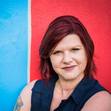Rachel Watts's Blog, page 4
January 19, 2017
Book review: The Golden Legend by Nadeem Aslam
January 17, 2017
What are you reading Wednesday
December 29, 2016
Book review: The Fifth Avenue Artists Society by Joy Callaway
“I’m honestly shocked that you didn’t paint yourself, Cherie. You’re so talented.” I said and she looked at me sharply. Mr Smith laughed and shook his head.
“She did make a little impression with that hobby of hers once upon a time, didn’t she?” Out of the corner of my eye I saw Alevia’s mouth drop open and then close just as quickly. “I can’t remember the last time she’s had time to paint with the baby coming and all of the entertaining.” He shrugged and Cherie’s face paled as she turned her eyes away, refusing to look at us and our wide stares.
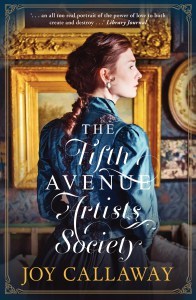 Virginia Loftin is a writer in a family of driven women, it is 1891 and the family is doing their best to get by after the death of her father. Her sisters, a musician, a teacher, a milliner, are each ambitious in their own way and her brother, a salesman, travels for work doing his best to keep the family afloat. Every cent that comes in is precious to the family, even the meagre income Virginia earns from her columns for the Bronx Review. Virginia loves the boy next door, Charlie, with whom she has been friends since childhood but in the opening scene of the novel Charlie pulls the rug out from under her by proposing to another woman. Virginia is devastated and starts writing a novel centering on a similar relationship. She drifts into a group of artists that meet at a house on Fifth Avenue, hosted by fellow writer John Hopper, with whom she quickly forms a friendship and romance. But amid the heady atmosphere of these occasions something dark is lingering around the edges and comes to threaten the precious success, and hope, that Virginia and her family gains.
Virginia Loftin is a writer in a family of driven women, it is 1891 and the family is doing their best to get by after the death of her father. Her sisters, a musician, a teacher, a milliner, are each ambitious in their own way and her brother, a salesman, travels for work doing his best to keep the family afloat. Every cent that comes in is precious to the family, even the meagre income Virginia earns from her columns for the Bronx Review. Virginia loves the boy next door, Charlie, with whom she has been friends since childhood but in the opening scene of the novel Charlie pulls the rug out from under her by proposing to another woman. Virginia is devastated and starts writing a novel centering on a similar relationship. She drifts into a group of artists that meet at a house on Fifth Avenue, hosted by fellow writer John Hopper, with whom she quickly forms a friendship and romance. But amid the heady atmosphere of these occasions something dark is lingering around the edges and comes to threaten the precious success, and hope, that Virginia and her family gains.
I’m a little mixed on how to review this novel, which is the first by its author Joy Callaway, a historical fiction about love and artists. I generally don’t read romance, it makes my skin crawl, but I was interested in this because of the historical element and the artistic bent. And true to form I found the romance element annoying, I found the toing and froing Virginia goes through as she ponders her future marriages deeply uninteresting. But what did capture my imagination was the way women navigated the society they were in, how they were able to keep their artistic endeavours, that drive to create that informed their very identities, while also pursuing marriage and family. Perhaps counter intuitively, Virginia fears a match with the wealthy John Hopper, with social engagements that would restrict her writing time. A marriage with Charlie, with lesser means like herself, would allow her to pursue a profession out of sheer necessity. She would be able to write.
Callaway’s style of writing is light, her pacing is quick and her plot is engaging. The tone was grating at first, heavy with information dumps in the first couple of chapters and it took me until about halfway through to really come to care about what happened to the characters. But by that stage I was racing through this novel, surprised at how driven I was to unravel the mess the Loftin family found itself in. While I found the early part of the book full of silly dramas and irritating navel gazing, the second half made it clear that Virginia was a powerful narrator and Callaway made some excellent decisions when it came to mining her own family’s history for the narrative gems.
The Fifth Avenue Artists Society, Joy Callaway: three stars
Published by Allen & Unwin, December 2016, AU$29.99 RRP.
December 28, 2016
2016 Redux: don’t let the door hit you on the way out
It’s the time of year for all those reflective blog posts, in which we look back, think, and look forward and promise to do better next year. And while I think the world’s internet users have collectively decided that 2016 should get in the sea, generally speaking, on a personal level my memoir might reflect 2016 as a space with no words, pages instead filled with open screaming mouths, things on fire, and me in there somewhere growing increasingly panicked and straight-jacketed by circumstances, finances and in some cases my very own self.
I know I obsess about stupid small things given the people the world forgot this year, and the other people the world collectively screwed over. It does alarm me that people are upset by celebrities dying rather than that by 2050 there will be more pieces of plastic in the ocean than fish. Which is abhorrent, uncited and possibly true. But then I heard that Richard Adams died and I remembered the audio cassette we had of Watership Down when I was growing up and I felt incredibly sad. Sometimes the small sadnesses are worse than the big ones.
Most of the other 2016 posts you read will probably seek some glimmer of hope in the shards. This is not a skill set of mine. The phrase circles my mind, “it’s always darkest before the dawn”, just forces me to wonder exactly how dark it can get. Pro tip: DON’T.
But look I suppose I’ve got my health.
I got 10 (TEN! COUNT ‘EM!) stories published, fiction and non-fiction, at actual respectable journals with editors and stuff.
I created some things that were painful and confronting to write and I think powerful to read.
But don’t take my word for it – I also got some kick arse marks for such pieces at uni.
I did paid work a bit, though not as much as I would have liked. I celebrated people voting for the first time. I survived going door to door for the Census. I learnt how to teach online.
I started to volunteer for arts organisations I really love.
I spent a dumb amount of time looking at my “author” tag on Goodreads.
But in a world in which everything is either on fire, sinking into the ocean or describing itself as not a Nazi while saying/doing things that seem kinda, a little bit, outright Nazi all of the above glimmers don’t seem to matter much. I spend a great deal of time at my computer, or phone, staring out at the world through a tiny screen, thinking in a horrified whisper: what have we done?
So here’s the thing. I haven’t reviewed a book for such a long time because I’ve felt a huge pressure to do “constructive” things. But it’s probably better to not view the world through a tiny screen.
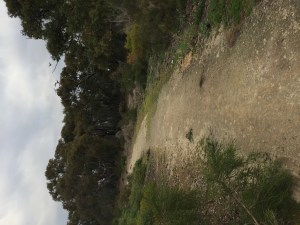 Take your own path.
Take your own path.When I run my route takes me through local bushland, the scrub opens up and the sky grows broad. At certain times of year there’s wildflowers, one time I saw a fat lizard, today there were cockatoos taking wing. I keep expecting to see a creepy clown in there on an overcast day (remember when that was the worst thing the world had thought of?), but haven’t as yet. And on those days the world is okay again. For a moment.
I think that that’s the way it works. Sometimes things are a bit terrible, sometimes I feel like I have nothing to say that adds anything useful. And that’s ok. But it’s also important to move often, and to give yourself permission to just watch the colours on the trees change, to eat slowly and to read great books that touch your heart and grab your imagination. Even though I feel I must always be busy, that everything just needs so much fixing, I write more and better when I also do those things. And I feel better too.
So here’s to excellent reading in 2017. Here’s to moving often, learning more, and spending time with people and in places that bring us joy. I commit to that for myself and I wish it for you.
November 16, 2016
Adventures in literature: 2016 Ubud Writers and Readers Festival
This is probably the latest blog post on the Ubud Writers Festival you’ll read this year, um, but better late than never? The tagline for this blog, though it’s a bit hidden with the new site, is Adventures in Literature and this year I had a chance to literally go adventuring with a trip to the Ubud Writers and Readers Festival. For those of you who are unaware, the festival runs annually in Ubud, Bali. It’s a four day festival and gathers together writers, performers and publishers from all around the world. I was able to tie in some of my university work with the festival, so I didn’t feel too bad about going away during semester. Here’s some thoughts, quotes and great moments from the four days.
Magda Szubanski: “Don’t know, don’t care” – in response to a question on whether or not male comedians were intimidated by her writing (and that
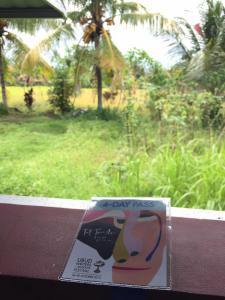 of other female comedians). I saw a lot of Szubanski in the course of the first day and I found her to be thoughtful, smart and expressive. She spoke about the pressure on her to write a comedy memoir, which is understandable, and how when she thought about it the book she wrote Reckoning, was the one that was in her heart. She also spoke about its being wrapped up with her coming out and what that meant for her.
of other female comedians). I saw a lot of Szubanski in the course of the first day and I found her to be thoughtful, smart and expressive. She spoke about the pressure on her to write a comedy memoir, which is understandable, and how when she thought about it the book she wrote Reckoning, was the one that was in her heart. She also spoke about its being wrapped up with her coming out and what that meant for her.Charlotte Wood: “It’s the lack of anger that perpetuates it” – on the “deep belly” anger that fueled her latest novel The Natural Way of Things . I go out of my way to see Wood as I find her to be a wonderful speaker on the process of writing, as well as the big picture her novels are placed in. She said if she thought too closely on ideas of misogyny she became paralysed, her best way to write the book was to focus on the characters. It was comforting to hear her say that each book teaches you how to write it and that it’s a process you have to learn over and over again.
Hanya Yanagihara – “As a writer I’m asking questions that keep me awake at night, not because I think writing the book will answer them but because I want to say to the world ‘this is what I’m thinking about, do you think about these things too?'” I didn’t get to see enough of Yanagihara (the author of my latest favourite novel A Little Life ) during the festival but when I did I found her every word to be intelligent and useful to me as a writer. Something that stuck with me was her comment that you don’t need to do a lot of research on trauma because there are very few ways for humans to react to hurt. Food for thought.
Books to buy, read and share: There were so many writers with so many amazing books over the course of the four days that I find it impossible to prioritise recommendations. I left the festival with Beauty is a Wound by Eka Kurniawan (which I haven’t finished reading yet but find hugely enjoyable) and The Years of the Voiceless by Okky Madasari. I’m also interested in the work of Susana Moeira Marques who read beautifully from her non-fiction book about death, Damon Young whose panel on The Art of Reading I wasn’t able to get to but heard great things about, Ariel Leve, Baz Dreisinger and David Dyer.
This festival is bigger than you think. I mean seriously. I had arranged to meet a friend at the afterparty and it was only when I arrived that I realised when you add up the attendees, presenters, authors and volunteers you’re talking thousands of people. Suffice to say I had trouble finding her. The main program runs all day for four full days across three venues. There’s also special events, workshops, a food program, a cultural program and an after dark program. It’s big.
Respect is free. This is probably the thing that struck me the most. A lot of the people you will meet are either volunteers or are paid not much for a significant workload. Nothing’s perfect but that most events ran smoothly means there’s been a million logistical victories behind the scenes. Most importantly it’s important to respect the hosts. I was witness to an MC being belittled by a panelist and it was hideous. Just be cool.
November 11, 2016
Your shopping list: buy Australian women writers
Your Christmas list: buy Australian women writers
I don’t want to alarm you but Christmas is just about six weeks away. I know. It felt too early to write this post, but the world seems a little dark lately and I wanted a distraction. You’re welcome.
I’m in a group of Australian women writers on Facebook, a group of smart, passionate, talented women who share job opportunities, resources and advice. A thread on there of publications this year made me think about gift giving. I’ve written about giving books as gifts before. It is possibly my favourite thing ever. I’ve given books as gifts to children who can’t read yet. (Yep, I’m that aunt. The useless one.) But it is important to support local artists and the local industry, so I’ve gathered a list of fiction published this year by Australian women authors for your interest. When I started this I had no idea how long the list would be, and how diverse. Please do make sure you make your purchases at local book stores, where you can, and support the industry. It’s also worth considering a charitable donation that supports literacy, my go to such charities are the The Footpath Library and the Indigenous Literacy Foundation.
Oh, and of course, this list is obviously not everything published this year, so feel free to add your recommendations of Australian books published this year in comments.
Fiction:
The Three Miss Allens, Victoria Purman
Sentinel Rising: The Reardon Files, Andrea Drew
The Paper House, Anna Spargo Ryan – A beautiful novel about loss and recovery. Five stars.
Vigil, Angela Slatter
Shield, Rachael Craw
We At the Road Like Vultures, Lynette Lounsbury – I have not read this but have heard good things and have it on my list.
Tailor Made, Clare Havens
Journey’s End, Jennifer Scoullar
Love Eliminiation: Sarah Gates
She’s the One, Bronwyn Stewart
Dying in the First Person, Nike Sulway – also haven’t read this, but Sulway’s Rupetta is amazing and you should read everything she writes.
Hospitality: How to Make the Most of Your Miserable Underpaid Existence, Yasmin O’Sullivan
Everything is Changed, Nova Weetman
Le Chateau, Sarah Ridout
The Twisted Knot, J. M. Peace
Bound For Eden, Tess Le Sue
Luxeville Dolls, Erin M McCuskey
Promising Azra, Helen Thurloe
The Blood Apothecary, Cayt Mirra
Skylarking, Kate Mildenhall
Dead in the Water, Tania Chandler
Dove, MH Salter
Who’s Afraid, Maria Lewis
Like I Can Love, Kim Lock
Falling Pomegranate Seeds: The Duty of Daughters, Wendy J Dunn
Game Day, Miriam Sved
The Science of Appearances, Jacinta Halloran
The Permanent Resident, Roanna Gonsalves
The Adventure of the Colonial Boy, Narrelle M. Harris
Castle of Dreams, Elise McCune
Wild Chicory, Kim Kelly
Jewel Sea, Kim Kelly
An Isolated Incident, Emily Maguire
Poetry!
White and Red Cells, Jessica Knight
Tongue Between Teeth, Jessica Knight
Anthologies:
A Feast of Sorrows, Angela Slatter
Alien Artifacts, various
Crime Scenes, various
Fine, Michelle Wright
Leaving Elvis and Other Stories, Michelle Michau-Crawford
Dark Magic: Witches Hackers and Robots, various (including yours truly)
Children:
Black, Fleur Ferris
The Squishy Taylor Series, Ailsa Wild
The Other Side of Summer, Emily Gale
Worm, Nicki Greenberg
My Dog Dash, Nicki Greenberg
The Naughtiest Reindeer, Nicki Greenberg
The Secrets We Keep, Nova Weetman
Our Dog Knows Words, Peter Gouldthorpe, Lucy Gouldthorpe
Wormwood Mire: A Stella Montgomery Intrigue, Judith Rossell
HIjabi Girl, Hazel Edwards and Ozge Alkan, illustrated by Serena Geddes
Becoming Aurora, Elizabeth Krasmer
The Leopard Princess Book 2: The Tales of Jahani, Rosanne Hawke
Lady Helen and the Dark Days Pact, Alison Goodman
Go Home Cheeky Animals, Johanna Bell, illustrated by Dion Beasley
All These Perfect Strangers, Aoife Clifford
Penelope Perfect (series), Chrissie Perry
Non fiction:
Doing it: Women Tell The Truth About Great Sex, Karen Pickering
No To Feminism, Rebecca Shaw – I predict this will be excellent.
Things My Mother Taught Me, Claire Halliday
Game Changers, Leena Van Deventer, Dan Golding
Enemy, Ruth Clare
Use Your Words: A Mythbusting, No Fear Approach to Writing, Catherine Deveny
Speaking Out, Tara Moss
Vagabondage, Beth Spencer
From Victims to Suspects: Muslim Women Since 9/11, Shakira Hussein
We Are All Going To Die, Leah Kaminsky
Suburban Nightmare: Australian True Crime Stories, Emily Webb
Quiet City: Walking in West Terrance Cemetery, Carol Lefevre
When Hope Speaks, Jessica Morris
Paved with Good Intentions: Terra Nullius, Aboriginal Land Rights and Settler Colonial Law, Hannah Robert
October 16, 2016
New work: Dark Magic anthology
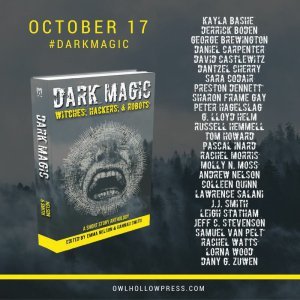 My science fiction story The Wasteland will be one of many excellent works to appear in Dark Magic: Witches, Hackers and Robots. The anthology will be released today by Owl Hollow Press. You should grab a copy.
My science fiction story The Wasteland will be one of many excellent works to appear in Dark Magic: Witches, Hackers and Robots. The anthology will be released today by Owl Hollow Press. You should grab a copy.
This story took a while to find a home for so I’m thrilled to see it in such a great home. Sometimes when a work is accepted there’s a feeling of everything just clicking into place. That this is the perfect, indeed the only, place for this particular story. This was one of those times.
September 20, 2016
What are you reading Wednesday
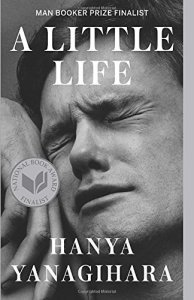 Hey, remember this old series?! It’s been a while!
Hey, remember this old series?! It’s been a while!
At the moment I’m still reading Hanya Yanagihara’s novel A Little Life, which I continue to love. Each character is so convincingly wrought and the central mystery of Jude’s past, and the care and responsibility his friends feel towards him, is so compelling. I really recommend this one and I can’t wait to review it.
I’ve also got a review copy of Samantha Stone by Janet Buck on my Kindle courtesy of Vine Leaves Press and I can’t wait to get into it.
Now it’s your turn. What are you reading and what is it like?
September 13, 2016
We are all too young to die
My dad died at age 39.
Since then I have grappled with what my self-help books would call an “unhelpful (or illogical) belief” that I would also die at that age. The circumstances that led to his death are unlikely to repeat themselves but even so, in my head my age is counted in “Years I Have Left”. Is this nonsense? Yes, quite clearly.
Be that as it may. I am now 36.
I tell you this for context. I am completing a Master’s Degree in creative writing, the central project of which is focused on remembering the dead. I read about death. I think about death. I inhabit a world in which the dead feel very close by. It’s, you know, a little depressing and a bit scary. Sometimes I feel quite unwell in the head. But also deeply connected to my sense of what the world is about, the concerns that I return to and, somehow, who I am. My life, for the time being, is informed by this.
Behind all of my creative work, and my research, this central event lurks. Though I write mostly fiction, I can’t help but find the deaths of people I know getting into its veins and circulating through it. And on occasion I find myself paralysed by it, gripped by the notion that this story is too close, but also that it is somehow not my story to tell.
So then, what is my story to tell? Certainly not my dad’s story. Not my mum’s or my sisters’. Not my partner’s. And yet, every iteration of a story that feels like mine comes out with recognisable elements. Points that I’m not certain I wholly own. This feeling is worse on those rare occasions when the story is good. Every story I have written that has been any good I have felt deeply conflicted about writing.
Is this inexperience? Or is it just part of the job?
In my memoir work, I feel I encroach on the stories of others too much to even consider publishing, which is a bit of a hindrance being that I’m a writer. I read a paper by Ruby Todd in Text recently about being inspired to write by personal loss. In her paper, Todd urged writers to ask themselves about the challenges, responsibilities and implications of the “gains” a writer has through personal loss. “If we put loss ‘to work’ in writing, what do we owe that loss?” she asks.
I’ve been asking myself something similar for a while and to be honest, I don’t know. I’m not even sure about this blog post.

